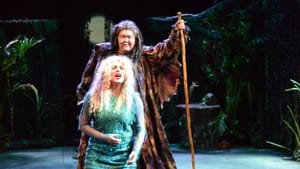Stay in the Loop
BSR publishes on a weekly schedule, with an email newsletter every Wednesday and Thursday morning. There’s no paywall, and subscribing is always free.
The truth about human romance
The Academy of Vocal Arts presents Antonín Dvořák’s ‘Rusalka’

Academy of Vocal Arts (AVA) deserves commendation for staying with the times. As operas presented outside the traditional triumvirate of Italian, French, and German become more commonplace, the institution has recognized a need to prepare its students for the kinds of work they will presumably encounter in their careers. Such considerations likely led to the school’s first-ever assumption of Antonín Dvořák’s Rusalka, a haunting mashup of Hans Christian Andersen and Slavic folklore.
The plot shares many similarities with The Little Mermaid, as the title character — an ethereal water nymph — leaves her aquatic kingdom to gain a prince’s love. With the help of an enchantress, she becomes a woman but loses her voice in the bargain. And she quickly learns that human romance isn’t all it’s cracked up to be.
The downside of fairy tales
K. James McDowell’s production leans into the fairytale aesthetic, sometimes to its detriment. The cast occasionally does battle with Peter Harrison’s overcrowded set, festooned in the first and third acts with green garlands and jutting branches ripe to be knocked over. The second-act scenery, meant to evoke the prince’s royal palace, looks like a cheap flower display.
Val Starr’s costumes, a mixture of fantasy-genre kitsch and overstated baroque grandeur, doesn’t flatter anyone in the ensemble. When Rusalka (soprano Kara Mulder) makes her entrance after being transformed in a sheath that barely meets her knees, I wondered if half her outfit had been ripped off on the way to the stage. Draped in unbecoming rags, the supernatural characters — sorceress Jezibaba (mezzo-soprano Alice Chung), water gnome Vodnik (bass Eric Delagrange), and the three wood sprites (Aubry Ballarò, Rebecca Gulinello, and Gabriela Flores) — look more messy than mystical.
Rising voices
AVA presents the opera in a piano reduction, as it has done for several large-scale works, including last year’s Das Rheingold. Despite the obvious skill of music director Luke Housner, the score loses its lushness. Without the composer’s richly textured orchestrations, the various styles Dvořák employed — from simple folk melodies to Wagnerian fanfares — become muddled and sound undistinguished. The approach strips the heroic music of its heroism.
Yet some of the singers rise well above the circumstances. Chung, a first-year resident artist, particularly excels in a role too often ceded to hooting character mezzos. Her rich, well-supported instrument thunders through Jezibaba’s warnings to Rusalka about the vagaries of human nature — and when her pessimism proves true, she’s chilling.
Tenor John Matthew Myers brings virile energy to the prince Rusalka loves, with ringing top notes and not a trace of strain. As the princess who feels entitled to his affection, soprano Claire de Monteil sings with fiery abandon, though she lacks some necessary nastiness.
But the evening should belong to Rusalka — and here, it only does intermittently. On opening night, Mulder needed much of the first act to warm up. Her high notes in Rusalka’s “Song to the Moon,” the opera’s signature tune, lack the requisite float, and the entire role seems a size too big for her genuinely lyric instrument. Still, she manages some lovely moments in the third act, after Rusalka accepts her fate as an angel of death, and her expressive face suits the long stretches when the voiceless character has nothing to sing.
Among the supporting cast, mezzo-soprano Pascale Spinney impresses as the youthful Turnspit, and baritone Anthony Whitson-Martini bumbles his way through the dotty Gamekeeper. Both singers seem poised to take on more substantial assignments.
Rusalka finds AVA somewhat outside its comfort zone. That doesn’t mean it’s not a risk worth taking. I hope to hear more Czech and Slavic repertory from the company in future seasons.
What, When, Where
Rusalka. By Antonín Dvořák, K. James McDowell directed. Academy of Vocal Arts. Through February 2, 2019, at the Helen Corning Warden Theater, 1920 Spruce Street, Philadelphia. (215) 735-1685 or avaopera.org.
Sign up for our newsletter
All of the week's new articles, all in one place. Sign up for the free weekly BSR newsletters, and don't miss a conversation.
 Cameron Kelsall
Cameron Kelsall